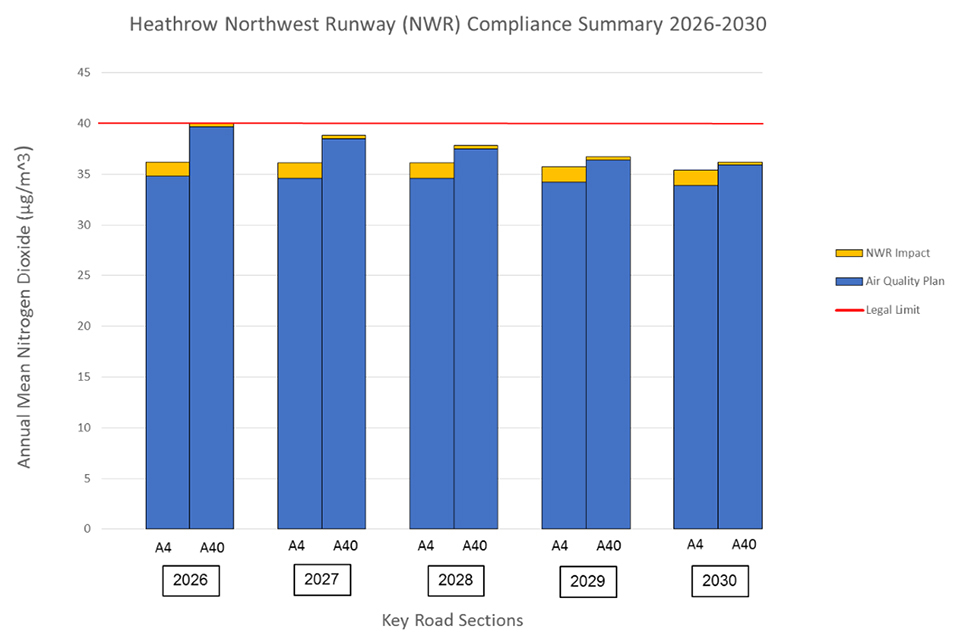Heathrow north-west runway air quality explanatory note
Published 21 June 2018
What does the Airports National Policy Statement say?
The government has been clear that expansion at Heathrow will not get the go-ahead unless the scheme can meet legal obligations on air quality. It is the government’s view, as set out in the proposed Airports National Policy Statement (NPS) that this is achievable. Our view has been informed by our air quality analysis of the Heathrow north-west runway scheme, which was published in October 2017 (PDF, 1.5MB). This analysis does not take into account scheme specific mitigations that any applicant could take forward to further address the air quality impact of expansion, for example an emissions charge to access the airport. To be clear, even without the additional interventions that are required of the applicant, we have demonstrated that air quality obligations could be met if Heathrow expansion occurred, recognising the inherent uncertainty associated with making forecasts into the future.

Heathrow north-west runway compliance summary 2026-2030.
The chart shows the A4, one of the places most affected by expansion, and the A40, one of the last places within the London Zone where air quality is projected to become compliant. As the chart shows, the impact of a third runway on air quality is small, and does not change the date when we are forecast to be compliant.
The Airports NPS makes clear that development consent will only be granted if, with mitigation, the scheme complies with legal obligations on air quality. The applicant is required to consider an extensive range of measures to mitigate the air quality impacts of the scheme. The Airports NPS lists possible mitigation measures that could be taken forward by an applicant. These include measures to address both road traffic and aircraft emissions, such as:
- rewarding airlines for using cleaner aircraft through differential landing charges
- reducing emissions from aircraft during taxiing (reduced engine taxiing)
- charging points and priority parking for zero and low-emission vehicles
- an emissions-based access charge
Most air quality issues around Heathrow stem from road journeys. This is why the Airports NPS specifically requires the applicant to set out how it will mitigate the impacts on the surface transport network. Further information is available in the Surface access explanatory briefing.
Any applicant will also need to demonstrate best practice in reducing emissions of air quality pollutants during construction. This could include, for example, using low-emission construction vehicles and freight consolidation sites.
What does the applicant need to do as part of its application for development consent?
Anyone applying for development consent will need to undertake a detailed assessment of the air quality impacts of the project, to be included as part of the environmental statement, showing existing and forecast levels of air pollutants, any likely significant air quality effects of the scheme and their mitigation. The latest available information will need to be used to underpin the assessment.
The applicant’s assessment must demonstrate that the construction and operation of the scheme will not affect the UK’s ability to comply with legal obligations on air quality. The precise package of mitigation measures will be subject to consultation with local communities to ensure the most effective measures are taken forward.
Enforcement
The details of a scheme for mitigation and how it may be enforced will be determined through the planning process, in consultation with local communities and relevant stakeholders.
The mitigations required by a designated Airports NPS would not be optional. Development consent would not be granted unless the mitigations described in the application for development consent meet the requirements in the NPS.
Mitigations would be imposed on the applicant as legally enforceable planning requirements and planning obligations, as appropriate. For example, if an emissions-based access charge was agreed as a measure to mitigate air quality impacts, the introduction of such a charge could become a planning requirement which the airport would need to comply with.
A breach of any planning requirement without reasonable excuse would be a criminal offence, and there are wide-ranging powers for the relevant planning authority to investigate and intervene should this occur. This includes criminal proceedings, fines or even court injunctions that limit the airport’s operations or prevent runway use in order to stop or restrain a breach.
